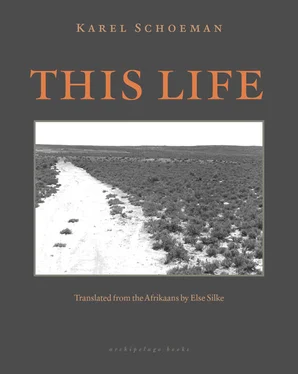I remember the wind that day and the fine dust penetrating between window and casement, and how it became so dark that I had to ask for a tallow candle in the middle of the day, and how cold it was, how icy the water in which I wrung out the cloths to lay on Stienie’s brow and to wash her swollen body. I gave her stuipdruppels and made her an infusion of duiwelsdrek to drink, and gradually she calmed down, but I could not leave her alone. Towards the afternoon the wind brought the first raindrops and then the rain came down, obscuring the land from view and breaking the long drought: Maans had probably reached town, but I knew he would not be able to return in that rain; thus I had coals put in the tessie and, wrapped in a blanket and with my feet on the foot-stove, I kept vigil beside the bed. Nothing, I thought to myself; the baby and the pregnancy and the ungainly body, the shortness of breath and the nausea and the fainting spells, the cramps and the swollen feet; exhausted after her ordeal, Stienie slept, her nightgown and her hair clammy with perspiration. It rained all evening and during the night I heard the steady sound of rain when I awoke on the cot at the foot of the bed, alone in the house with the exhausted woman and the maid asleep on the floor in front of the kitchen stove.
The Cape cart did not return before the following afternoon, ploughing its way through the heavy mud churned up by the wheels and the horses’ hoofs, and Maans brought the doctor along, his mount tied behind the cart; he, too, would have been paid a lot of money to undertake the long journey to the farm in that weather. He examined Stienie without saying much, and from his silence I gathered there was a lot he was keeping to himself and not telling us. That evening he lay down on the bed in the guest-room, fully clothed and covered by only his coat, and at daybreak the following morning his horse was saddled and he rode back to town through the mud and the brimming streams. He still had not said much, but he left behind powders and drops for her to take.
After this, Maans took Stienie down to the Boland: he waited a few days to arrange matters on the farm and for the road to become passable again, and then they left. The sheep had not yet been sent down to the Karoo and he said he would get a message to Fisantkraal and ask Coenraad to come and help us, but what did Coenraad still care about us? He had probably already left for the Karoo himself but, be that as it may, nobody arrived and at last I arranged the trek myself. Fortunately Maans had dependable workers, something with which Father had never been blessed, and I made them carry out everything in the house and load the wagon, and so we left for the Karoo, Pieter and I and the herdsmen and their families, no longer down the rocky ledges and slopes of Vloksberg Pass, bouncing and jolting from ledge to ledge with the abyss looming below, but by way of the new road down Verlatekloof. The journey was quicker now but it still took a few days, and those few days were once again a time of freedom, with no one to give orders or demand explanations, no one to look and to ask and to wonder, only the silent, indifferent presence of the driver and the herdsmen with their families, and Pieter across from me at the camp fire in the evenings. I had to look after the wagon and the oxen, as Maans usually did, or Father or Coenraad in the old days, I had to make decisions and the farm-hands came to me for instructions, but the burden of responsibility rested lightly on my shoulders, and as our trek with wagon and sheep descended down the narrow kloof, it seemed to me as if our route had been reversed, the direction lost for a moment, as if in reality we were ascending, climbing up the slopes, to the cliffs where the wind swept across the rolling land of the escarpment, to the shadowless white brightness of the light, and I experienced a dizzying freedom as I had that day after Mother’s death, alone in our town house. A few days, that is all, that is all it ever was; a week or two at a time is all I was ever granted, but it was enough, and every time the gift of it left me delighted and surprised. We arrived in the Karoo, we settled into the little house Maans had built for them in the meantime as a winter residence, and in due course he returned from Worcester and joined us. He did not say much about Stienie, but she had stayed behind in Worcester where she had relatives and where the doctor knew her; later she went to the baths at Goudini for a while and she also spent some time at the seaside. She was away all winter and only in spring, when we had returned to the Roggeveld and had settled on the farm once again, did Maans fetch her from the Boland.
It was a good time for me, those winter months Maans and I spent together in the Karoo, for he had remained unchanged over the years, a quiet, grateful boy who made no demands, and it was no trouble keeping house for him. Yes, I still say “boy”, though he was a man of forty; as we sat together in the evenings in the glow of the candlelight, I suddenly noticed the first silver in his dark hair, and sometimes when he forgot about my presence and was deep in thought, he suddenly looked tired and defeated, so that my heart ached to see him, for what could I say or do to help? But still, during those few months of Stienie’s absence it was as if something of the old closeness between us had been restored and he became to me once more the child that had been given into my care on my return from death’s door, the child that I used to carry everywhere on my arm or lead around by the hand, and that I had come to regard as my own.
Of course old Tant Neeltjie spread rumours when she left us and people were curious: what they surmised never came directly to my ears, but I was aware of the barely suppressed eagerness with which they asked after Stienie’s health and how long she would be away and where she was visiting, the inquisitive eyes hoping that my expression might give something away that my hollow or evasive words did not give up. I did not know much more than they, however, perhaps even less, given the fact that I did not share in Tant Neeltjie’s wisdom. Once or twice towards the end of winter Stienie sent me a note to say that she was well, but more than that she did not disclose and, anyway, Stienie had never been very comfortable with a pen in her hand, so that I was uncertain what to expect when Maans brought her back to us at last after so many months.
It was clear that she had been very ill: Stienie had never actually been slender and over the years she had grown stouter, but now she was very pale and she looked at us sharply, with dark, glittering eyes, in a way unfamiliar to me — “inquiringly” I might call it, but the word is not strong enough, and perhaps “suspiciously” ’ would be a more accurate description. At first she was very quiet, almost resigned, and asked few questions about the house or the farm and said nothing about what had happened or changed in her absence, almost as if she did not even notice. She was friendly, but preoccupied, uninterested in her surroundings and with an air of detachment towards Maans and me, and yet it was not because she felt listless or weary, on the contrary, for we were constantly aware of a barely concealed energy that might burst out suddenly. It never happened, however, and as we sat down for supper on that first evening together, I realised that there was no need to fear an outburst, for in an unguarded moment I saw her eyes from across the table in the lamplight and, surprised, I realised that she was afraid of me, though it was hard for me to accept it. Over the weeks and months we spent together the knowledge grew in me, however, and I began to understand the reason for her fear: she was afraid of me because I had seen her naked, swollen body, the hair stuck to her brow and the fear and despair in her eyes, she was afraid of the one whose hands she had clung to in desperation and who had covered her mouth with a pillow to smother the sound of her wailing. I had seen and heard too much, I knew too much, and she would never free herself from the shadow of this knowledge or forgive me for the power I had inadvertently achieved over her. I lived in Maans and Stienie’s house and depended on their charity, and yet I speak of her now as if she were a naughty child: I must say, though, that after Stienie’s return I never had trouble with her again; after her return she knew where she stood with me.
Читать дальше












